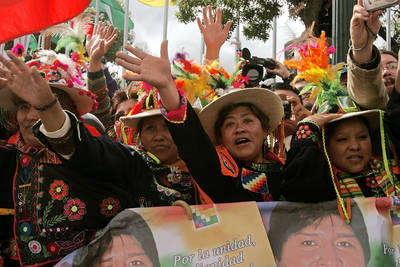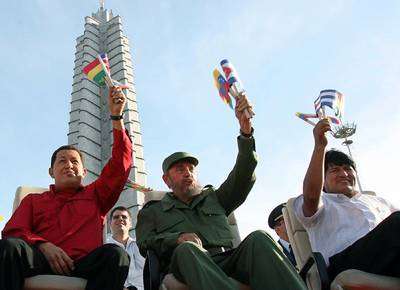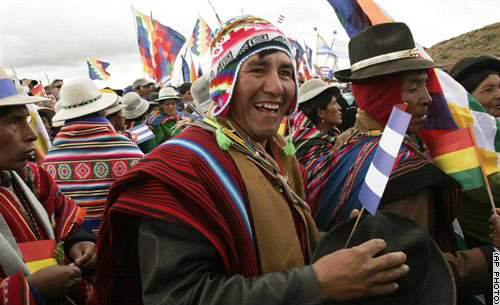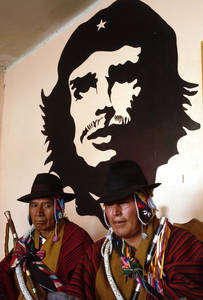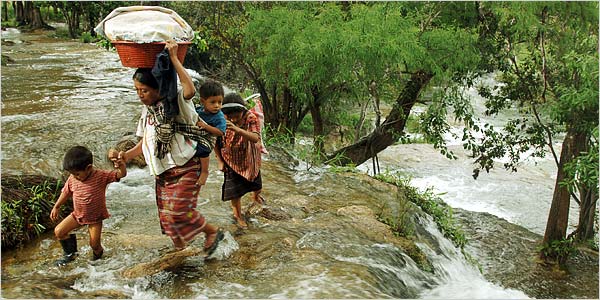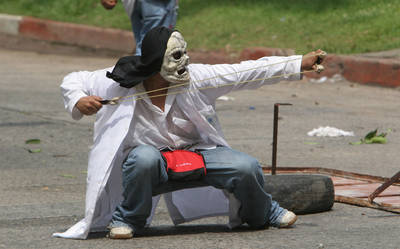Course Content:
The
nations of Latin America
& the Caribbean are richly diverse within and between each
other, but they share a common ancient, colonial, and postcolonial
historical
experience,
and today face many common challenges and opportunities. As a unified
sociocultural
region it belongs to the world's so-called South, integrated for five
centuries
now to the modern capitalist world order - an order which unfortunately
remains very much still
structured to
sustain, defend, and expand the interests and privileges of the world's
so-called North, despite repeated attempts at redistributing global
wealth and
power more equitably. Latin America's national economic elites have
long been
invariably acquiescent - when not openly champions
- of this persistently unbalanced global structural arrangement, so
despite almost two centuries since independence from European
colonialism, Latin America
has been and remains the
world's most socially unequal region. In contrast, Latin America's
political regimes exhibit a much wider range of politics and types,
reflecting the
fierce social struggles in the
region, external intervention (mostly U.S.) and the periodic strong
popular resistance to the successively
discredited imported models of development and
modernity. The intense cultural and social dynamics in this
region have thus been profoundly contradictory and
exceptionally complex.
This
course therefore explores the contemporary and historical
conditions of this fascinating region
of the modern world-system from three
interrelated
angles of vision: (a) first, at the broadest level, and representative
of the
unequal world order within which Latin America has had to exist since
its incorporation into the modern world, we explore the highly problematic core-periphery
relation between the
U.S. and Latin
America over the last century; (b) then,
at
the regional structural level, we analyze the economic, political,
social and cultural
transformations associated with the impact of globalization on Latin
America and its difficult, often frustrated, search for
its own modernity and enhanced peoples' livelihoods; and (c) finally, at the grassroots
level, we conclude the course identifying and analyzing some of the
social
movements, and the creative
cultural activities
they constantly rely on as Latin Americans seek social justice and to
redefine modernity in their own
ways.
Course Structure:
Class Presentations, Midterm Exam: The
course relies on the active involvement
of students in their own process of learning. Class
attendance is therefore mandatory (tardiness, early leaving, and
unexcused
absences
will be
penalized); more importantly, students will be expected to come to
class fully prepared to discuss their reading assignments, and to be
randomly quizzed by Dr. Santos
accordingly.
During the first third
of the quarter, Dr. Santos will lecture and students will come to
class fully prepared to
discuss
the Grandin
textbook. A midterm
exam will be given on
Friday, February 9th, based
on
this textbook and Dr. Santos'
lectures.
Starting on January
24th and for the remainder of the course, students will begin making
class presentations, in groups. Nine groups of mostly two students - a
few with three - will be formed to that effect. On a rotational basis, one such group per class
session will make class presentations during the days we'll be covering
the Gwynne
& Kay textbook;
two
such groups per
class session will make class presentations when we cover the Sommer
textbook. The aim here is for each group to
be able to present three times in the course.
Each time a student group presents, the students
will take turns selecting
and critically assessing
what they thought were the most significant issues or
aspects contained in their
assigned (and divided up) reading selections for that day. Each student
presentation should last between 6 to 10 minutes. The presentations
must be delivered as PowerPoint presentations
(please print or email each one to Dr. Santos; and please, do not
CLUTTER slides with too much
text -- make more slides
instead!).
Students are
responsible for uploading and pre-testing
their presentations before class starts. (If you use overhead
transparencies please use VERY BIG FONTS!)
All
individual presentations, regardless of format, should end with at
least one well-thought-out question
for
discussion. Following
the individual presentations,
there will be class
discussion starting with the questions raised. Of course, students not
presenting are most encouraged to participate with their own questions
or observations. For presenting students, it is very gratifying to
realize that their audience is well informed and responds interestingly.
It is the responsibility of the
groups
to meet beforehand to
plan how they will
divide up the sections or aspects of the readings, and
to organize the order of their individual presentations. It is strongly
advised for the groups to read the entire material first, then schedule
to meet to
organize and divide things up, only then should each student prepare
his/her own presentation. Finally, presenters should meet early on the
day they present to upload the presentations and test them. Use USB
memory sticks and as backup email your presentation to your Runner
email account and to Dr. Santos.
The individual presentations
will be
graded based on how well organized,
clean and visually pleasant the presentation is; how well selected
the significant issues or aspects were; the strength of the
critical assessment; the accuracy of all statements; the personal
communication skills displayed.
The group
presentations
will also be assessed a grade based on the quality of the overall organization of
the themes or aspects covered.
Research Project: Each
of the groups
will design, research,
and write a final research project on any relevant sociohistorical
topic related to the course. The
subject
matter
and the time frame chosen may be as broad or narrow as each group
wishes, involving all Latin American nations, or a few, or just one; it
may cover a time frame of
centuries, a few decades, or merely the contemporary scene. The subject
matter may be divided up among the students chronologically,
thematically, or in comparative fashion between peoples, but it
ultimately must be historically grounded and sociologically oriented.
The students must obtain pre approval
from Dr. Santos
for both their overall group topic and for their individual
subtopics by Friday, February 16. Students may consult with Dr. Santos
during his office
hours - no emails on this topic, please.
Each
student will individually write his or her own paper,
between 6 and 8 pages in length (apart from the bibliography),
double-spaced, font 12, with one-inch margins. Students must submit
their individual papers electronically (in Word, please) and their
assembled research project volume in paper. The volumes must be bound,
have a
title
page, a table of contents listing each individual title and student
author,
and the actual papers; continuous page numbering between papers and a
single, common
volume bibliography
are unnecessary and are actually discouraged (so as to not waste time);
each
paper should start
with the paper title and author at
the
top, be independently numbered, and have a bibliography at the end.
Each individual paper should have a well
stated, well focused
research hypothesis, research topic, or question, a variety of
citations from the scholarly literature consulted, if need be
descriptive data (charts, graphs, maps, etc.), and a strong critical
analysis
section leading to a
conclusion. Papers
will
be graded for clarity and
organization, quality of analysis,
accuracy, and relevance of assembled data.
For guidelines on how to write a good
research term paper, citations
&
bibliographic styles, etc., please go to the following URL: http://www.csub.edu/~gsantos/Guide-Paper.html.
Extra
credit: There are two general studies
courses that
students are strongly
encouraged to take if they wish to develop their research skills, and
if they do will receive extra credit
in this course:
GST
126 - Researching
the Electronic Library
(2 units)
Introduces students to effective
research techniques using Library
electronic resources. Emphasis will be placed upon skills necessary for
the identification, retrieval, and evaluation of information for
general and specific topics. Students will acquire the competencies
necessary to develop an effective search strategy and find research
materials, including references to journal articles, full text articles
in electronic format, government publications, books, and Internet
resources.
GST 153 - Research on the
Internet (2 units)
Introduces students to the
information resources available on the
Internet for research purposes Students will develop general knowledge
of the Internet, navigation skills, effective search strategy skills,
familiarity with Internet finding tools, evaluation methodologies and
other Internet research skills.
Contact: Ms. Christy Gavin
Librarian, Walter W. Stiern Library
cgavin@csub.edu
661-664-3237
Plagiarism:
To
prevent students from wittingly or unwittingly engaging in plagiarism,
Dr. Santos strongly recommends students to carefully read and abide by
the document CSUB
Classifications of Plagiarism found at: http://www.csub.edu/tlc/options/resources/plagiarism/4plagiarimclassifications.htm.
Furthermore, students are advised
that
all electronically submitted
papers will be sent to TurnItIn.com,
a
professional web site that some CSUB faculty subscribe to and now
routinely
use to quickly detect plagiarism. Anyone found guilty of engaging in
plagiarism will automatically fail the course and be reported to
the Office of Student Discipline and Judicial Affairs for further
disciplinary action.
Grading: The midterm exam will count for 30 points. The
class presentations will count for up to 30 points. The research term
paper will count for 30 points. Class preparedness, participation and
perfect
attendance will
count for up to 10 points. Extra credit may be up to 3 points per GST
class
taken & passed. The final
letter grade
will be assigned, on a
scale
of 0 to 100, as follows:
| 94-100 = A |
87-89 = B+ |
77-79 = C+ |
65-69 = D |
| 90-93 = A- |
84-86 = B |
74-76 = C |
< 65 = F |
|
80-83 = B- |
70-73 = C- |
|
Office Hours & E-Mail to
Dr.
Santos: All
students are
encouraged to
visit
(or if you can't visit, call) Dr. Santos regularly during his posted
office hours, especially
to
ensure
their research paper topics are
well chosen and organized, or to discuss anything related to the texts
or the class lectures, videos, reading assessments, or class
discussions. Private - but brief
and to the
point
- e-mail messages may be sent to Dr. Santos (NOT a substitute for
office visits or calls,
please) -- expect a single-line answer.

Schedule of
Assigned
Readings
|
Week
|
Monday
|
Wednesday
|
Friday |
| 1
Jan. 1, 3, 5
|
---
|
Introduction to the
class
|
Grandin
Intro. & Chapter 1: How Latin America
Saved U.S.
|
| 2
Jan. 8, 10, 12
|
Grandin
Chapter 2: Toward a New Imperialism
|
Grandin
Chapter 3: The Violence of the New Imperialism
|
Grandin
Chapter 4: The Politics of the New Imperialism
|
| 3
Jan. 15, 17, 19
|
Holiday
MLK Day
|
Grandin
Chapter 5: The
Economics of the New Imperialism
|
Grandin
Chapter 6: The
Failure of the New Imperialism
|
| 4
Jan. 22, 24, 26
|
Grandin
Conclusion: Iraq & Latin America
|
Gwynne
& Kay
Chapter 1: Latin America Transformed: Globalization & Neoliberalism
__1__
|
Gwynne
& Kay
Chapter 2: Modernity & Identity
__2__
|
| 5
Jan. 29, 31, Feb. 2
|
Gwynne
& Kay
Chapter 3: Economic Structural Reform
__3__
|
Gwynne
& Kay
Chapter 4: Globalization & Central
America/Caribbean
__4__
|
Gwynne
& Kay
Chapter 5: The Urban Revolution
__5__
|
| 6
Feb. 5, 7, 9
|
Gwynne
& Kay
Chapter 6: Political Economy of
Sustainable Development
__6__
|
Gwynne
& Kay
Chapter 7: Authoritarism & Democracy
__7__
|
Midterm Exam
|
| 7
Feb. 12, 14, 16
|
Gwynne
& Kay
Chapter 8: Technocratic Democracies?
__8__
|
Gwynne
& Kay
Chapter 9: Livelihoods and Globalization
__9__
|
Gwynne
& Kay
Chapter 10: Civil Society &
Movements
__1__
|
| 8
Feb. 19, 21, 23
|
Gwynne & Kay
Chapter 11: Urban Livelihoods
Chapter
12: Rural
Livelihoods
__2__
__3__
|
Gwynne & Kay
Chapter 13:
Alternatives to Neoliberalism
___4__
|
Sommer
Sommer/Intro:__5__
Barbero/Intervening:_6_
|
| 9
Feb. 26, 28, Mar. 2
|
Sommer
Barbero/Between:_7_
Taylor/DNA:_8_
|
Sommer
Canclini/City:_9_
Nelson/Cultural:_1_
|
Sommer
Matory/Tradition:_2_
Godenzzi/Discourses:_3_
|
|
10
Mar. 5, 7, 9
|
Sommer
Arias/Conspiracy:_4_
Regaunt/Radio:_5_
|
Sommer
Corte/Olodum:_6_
Ramos/Political:_7_
|
Sommer
Briones/Questioning:_8_
Hale/Cultural:_9_
|
|
11
Mar. 12
|
Sommer
Izquierdo/Crossroads:_?_
Pratt+Lomnitz/Afterwords:_?_
|
Research Papers due
by noon on Friday, March 16 at Dr.
Santos' office
|
My
Group #:
______
The dates & selection I present on:
.
_
______________
.
______________________
.
______________________
.
My Group Research Project title:
___
.
My own research paper title:
_______
.
My other group members names
Phones
Emails
1.
.
2.
.
3.
.

